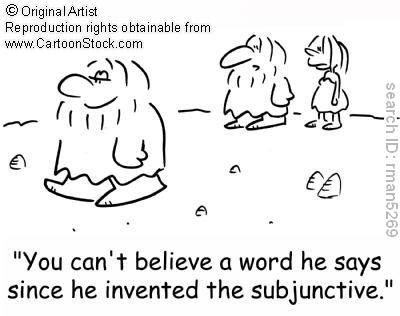… or the frustratingly-complicated English language, depending on your mood. Here’s the example: Discussing the minimum wage issue with some students, I found myself saying,
“With a minimum wage, employers will have to pay more than they would have had to have paid in a free market.”
Snip: “… they would have had to have …”
Imagine learning to say that comfortably, especially if you’re a non-native speaker.
I’m guessing that’s the subjunctive passive past-perfect? Linguistic precisionism from grammar experts welcome.

That’s actually incorrect:
It should be “than they would have to pay in a free market”
It’s future subjunctive, not future past subjunctive.
And as non-native English speaker, I have no problem with this at all.
You should try the verb forms in French, German or Latin 😀
The easiest one for verbs is Russian, but that one sucks because of the declinations.
Either is correct. One can hypothesize a future present, and from that future present one can also imagine a past scenario.
Don’t know if it’s true, but heard that English is an amalgam of three primary grammar systems from source languages, hence its notorious lack of consistency. An elderly German woman I know related that in the 50s she had traveled to England on a Viscount airplane, pronounced “Vie-count”. Later she roused chuckles from her hosts by informing them that she bought something in a “die-count” store.
Ah ‘pro libertate’, you are showing your non – native roots. It should be ‘than they would have had to pay’. The expression ‘would have had’ is in the subjunctive because it’s a conditional clause. The infinitive ‘to pay’ does not change tense.
I sent a comment on my ‘smart’phone last night, but in case it did not get through I’ll comment, and elaborate further, here:
Dear Pro libertate and Stephen Hicks: you are both barking up the wrong tree.
“With a minimum wage, employers will have to pay more than they would have had to have paid in a free market.”
This statement will of course be understood, but it is not really correct. We are dealing with a closed or impossible conditional statement: ie. we are imagining pay terms in a free market that does not exist. In this case, the correct expression is:
‘than they would have had to pay in a free market’
You have extracted ‘they would have had to have’ from your statement to the student, but you have broken up the English incorrectly. The statement breaks down thus: ‘they would have had’ is subjunctive, because it’s in a conditional. ‘to pay’ is an infinitive and does not change its tense (‘to have paid’ = perfect infinitive).
(If we were talking about a hypothetical conditional, in which scenario a free market may be an option in the present or the future, one would write:
‘With a minimum wage, employers will have to pay more than they would have to pay in a free market’
Can you see the difference?)